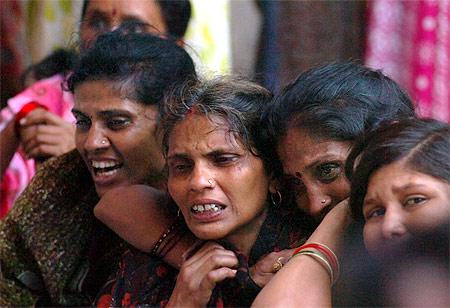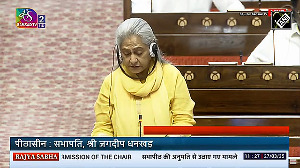
In May, it will be three years since 7-year-old Yogita Thakre was found dead in a car in the compound of the home where BJP President Nitin Gadkari lives in Nagpur.
In the first part of her investigation, Toral Varia Deshpande traveled to Nagpur to uncover the mystery surrounding the child's death, a case whose investigation was recently criticised in court.
Here, she meets with Yogita Thakre's family and recounts their struggle for justice.
For Yogita Thakre's family, each day is a struggle to seek justice for their seven-year-old daughter.
The child died in mysterious circumstances in May 2009 in the compound where Bharatiya Janata Party President Nitin Gadkari has his home in Nagpur.
"What is being given so far is not justice in the true sense. It is justice of convenience," says Vimal Thakre, Yogita's mother, 55, who works as a domestic help in Nagpur's Mahal area, generally known as old Nagpur.
On May 19, 2009, Vimal, on her way to finish her chores, gave into her daughter's demands to play in the then open compound of Gadkari Wada, the BJP leader's home.
She asked the guards posted at Gadkari's home and one of his drivers to keep an eye on Yogita. These men were known to her, she said.
When she returned in the evening, Vimal says she found her daughter dead in a Honda CRV vehicle bearing the number MH-31-DB-2727.
"Today when I remember her, all that I see is her bruised and bloodied body. I get sleepless nights. My child has not died accidentally. She was killed. Someone must have tried to molest her before murdering her. I just know it," alleges Vimal Thakre.
"Let the CBI (Central Bureau of Investigation) probe the case and the truth will come out," adds the grieving mother.
Vimal says she now goes about her work mechanically to earn a living so that the family can continue their fight for justice.
Yogita's father Ashok Thakre works at a tea stall. The family makes around Rs 6,000 every month.
"We are being helped by people like Jammu Anand (president, Domestic Workers Union, Nagpur), and lawyers who help us voluntarily."
"Yogita died in mysterious circumstances. They (the police) say hers is an accidental death. But I am sure she was murdered," says Yogita's eldest sister Kiran. "There is enough and more evidence."
"Clearly, the police are trying to shield someone close to Gadkari," alleges Kiran.
Kiran was to appear for her Class 10 board examination the year her little sister died. Since Yogita's death, all Kiran has done is attend court hearings, file Right to Information petitions, send letters to the Maharashtra home department and try to understand the legalities involved in the case.
"Gadkari is a powerful man," says the bereaved sister. "He was not even there on the day of the incident. Even so, the police have messed around with the facts from day one! Clearly, they are trying to protect someone."
"I am not giving up till I get to know how and why my sister died," Kiran declares. "I have left everything I wanted to do in life behind me. Now all I want is answers to the questions."
Among her many questions:
Neighbours like Kishore Ingle urged the family to register an FIR, a First Information Report, in the case. Registering an FIR was the first of many battles that the family was destined to fight.
Recounting the events of that fateful night, Kiran says, "We went to the police station around 9 pm or so to register an FIR. I was there along with my father and neighbours. Till midnight they (the police) kept delaying the process. They would come up with random demands like getting Yogita's body to the police station."
"How could we get the dead body to the police station? The senior police inspector was constantly on the phone. Maybe they were trying to indirectly pressurise us to go home. Maybe they were taking instructions from someone. I don't know," Kiran recalls.
"When we decided not to budge, the police were forced to take down our complaint. Finally, at about 12.40 am on May 20, the police accepted our complaint," she adds.
At 2.30 am, the police registered a case of accidental death.
Ingle, who lived next door to the Thakre family, has helped the family since the night of the incident. "I don't get time to attend every hearing as I have a regular job. But I ensure that through letters and RTIs the family keeps the communication with the government on."
The family has written three letters to the Maharashtra home department, which finally led state Home Minister R R Patil to take notice of the incident last December, more than two years and seven months after Yogita's death.
"Abba (as R R Patil is known) assured us that he will look into the matter and help the family as much as he can," says Ingle.
"He has promised this; now let us see when he acts," Ingle adds. "We have waited for all this time for some serious action. We can wait some more."
Midnight visits by strangers dressed in police uniform and threats to withdraw the case from the high court are now a regular occurrence, allege the Thakre family.
"We don't know who these people were. We don't even know if they are real policemen or not," says Kiran. "When we went with a complaint to the police to provide us security, they not only did not provide us any protection, but on the contrary alleged that we are registering bogus complaints."
According to Kiran, the police wrote to the Thakres after ten days, saying the man in police uniform, who the family alleges threatened them, did not exist.
The police added that after they questioned the Thakres's neighbours, they claimed there were no such late night visits by strangers.
"Will the police ever indict their own men?" asks Kiran. "Do strangers come knocking at the doors of neighbours and announce that they have come to threaten us? Aren't the police supposed to conduct an investigation on their own beyond just asking the neighbours?"
As a result of these complications and frequent visits by men dressed in police uniform, the Thakre family was forced to look for another accommodation.
"The landlord did not want to get involved in all this and asked us to move out. It was not easy looking for another accommodation. We had to settle for whatever was available," says Kiran.
"My mother had to look for new homes to work in. Now because of the recent developments in the case," she adds, "our current landlord is asking us to move out."
"Instead of attending classes," says Kiran, "all I have been doing is attend hearing after hearing -- sometimes in the magistrate's court, sometimes in the high court. I have left my studies behind. All I want is that the case be handed over to the CBI."
"One day, maybe when I become a lawyer," Kiran says, "I will ensure that justice is done."
Image: Family members on the day Yogita Thakre died.
Note: This correspondent tried contacting Nitin Gadkari's driver and personal secretary for their account of events that day in May 2009, but both men refused to comment.
Part 1: Death at Gadkari's home: What happened to 7-year-old Yogita?









 © 2025
© 2025